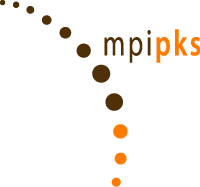
Probing Complex Quantum Dynamics through
Out-of-time-ordered Correlators
Workshop Report
Probing Complex Quantum Dynamics through Out-of-time-ordered Correlators (PROTOC21)
Scientific Coordinators:
Rodolfo A. Jalabert (Strasbourg, France), Klaus Richter (Regensburg, Germany)
The workshop, initially planned for 12-16th October 2020, took place on 11-15th October 2021, with a hybrid format where one half of the speakers were present and the other half delivered their talk remotely. 34 participants (20+locals) were present on site and 136 scientists participated virtually, making it a highly international meeting with participants from 27 countries which encompassed the scientific leaders of the field, as well as many young scientists. A special place was reserved for PhD students and post-docs, with two central slots for poster sessions (in virtual format) and a further slot for a flash poster presentation (in hybrid format). The well-attended Monday colloquium was given by Prof. Roderich Moessner (MPI-PKS) on the subject of “Many-body chaos and order, through the lens of OTOCs” presenting the broad subject of the conference to the large community of Dresden physicists.
The workshop was markedly interdisciplinary, since the subject of OTOCs is of present interest to various fields and is linking usually scientifically disconnected research areas. We thus had participants from several Physics domains. Among them, Quantum Chaos, Statistical Physics, Condensed Matter Physics, Atomic Physics, Quantum Open Systems, and General Relativity. Theory and experiment were both present in the talks and in the scientific discussions.
The recent advances in physics of OTOCs were discussed in the workshop, with a particular emphasis on issues related with many-body Quantum Chaos. While one-body Quantum Chaos is by now a mature discipline, with well-established results, its many-body counterpart is considerably less developed, given the difficulty to characterize the many-body quantum dynamics and the corresponding operator growth. The OTOC then appears as a highly valuable tool, since it allows for a characterization of the operator growth and information scrambling according to laws that are being explored. A particularly important development treated at the workshop comprised the universal bounds on the OTOC (referred to as “bounds on chaos”), and results concerning the conditions to reach these bounds were presented. The connection of OTOCs with the Eigenstate Thermalization Hypothesis, the Fluctuation-Dissipation theorem, and many-body localization were also established.
In addition, experimental realizations of OTOC protocols were discussed, as well as technical advances and challenges related with semiclassical approaches to OTOCs in the many-particle case. The important connection of the OTOC with holography and quantum gravity, which triggered the recent broad attention to OTOCs, was presented by several speakers, trying to bridge into the domain of Quantum Chaos. It is expected that such a connection will be further developed in the near future.
The success of the meeting would not have been what it was without the precious help of Mrs. Katrin Lantsch from the conference secretariat providing optimum administrative assistance during all stages of the organization, and of Mr. Ronny Börner providing perfect technical assistance for the remote participation. The organizers are particularly indebted to both of them.
